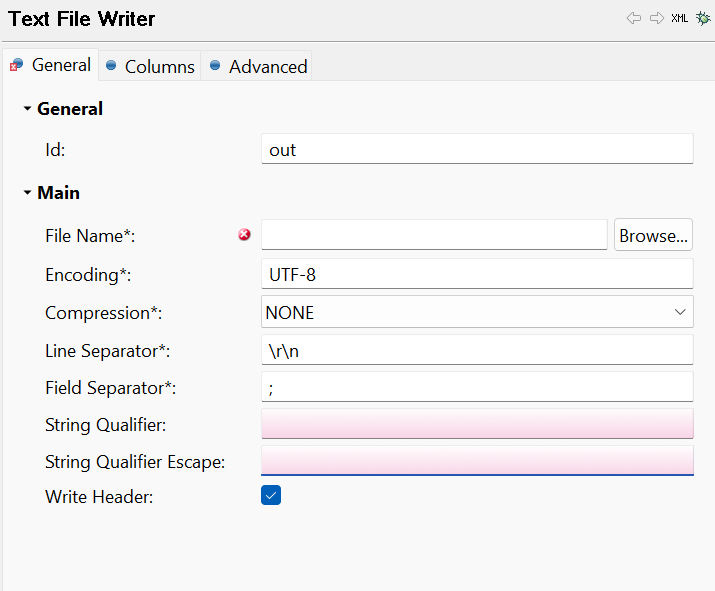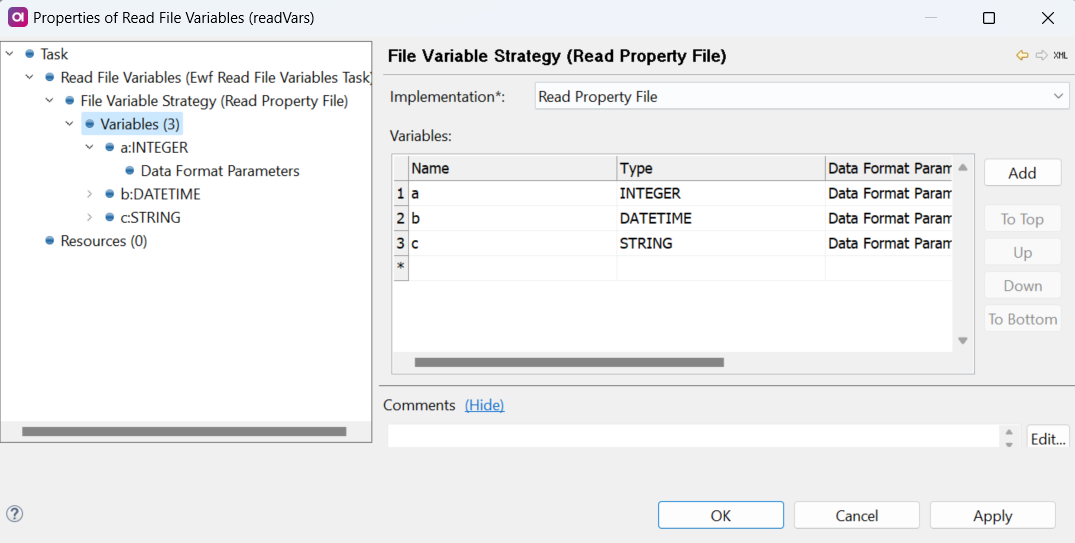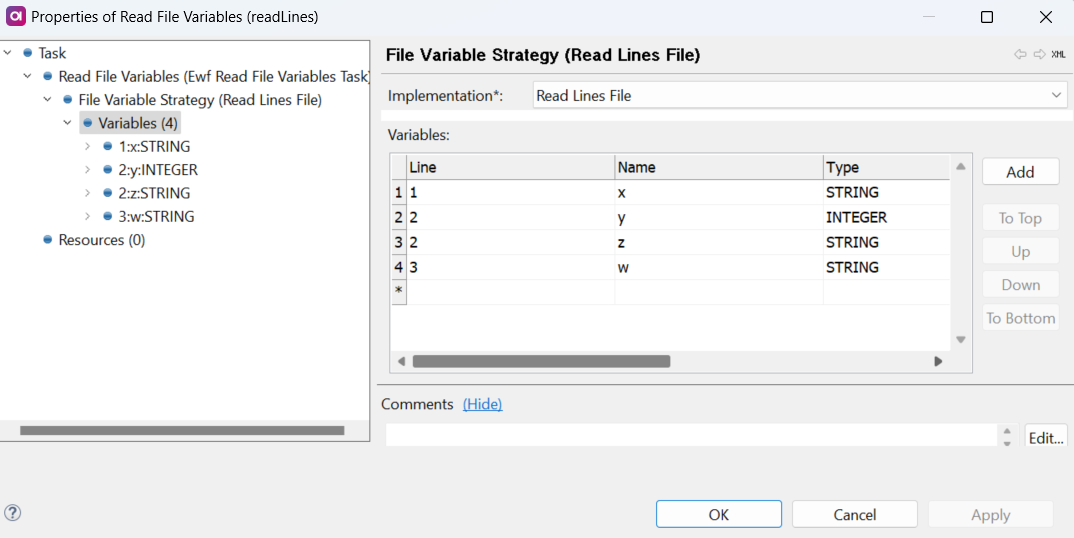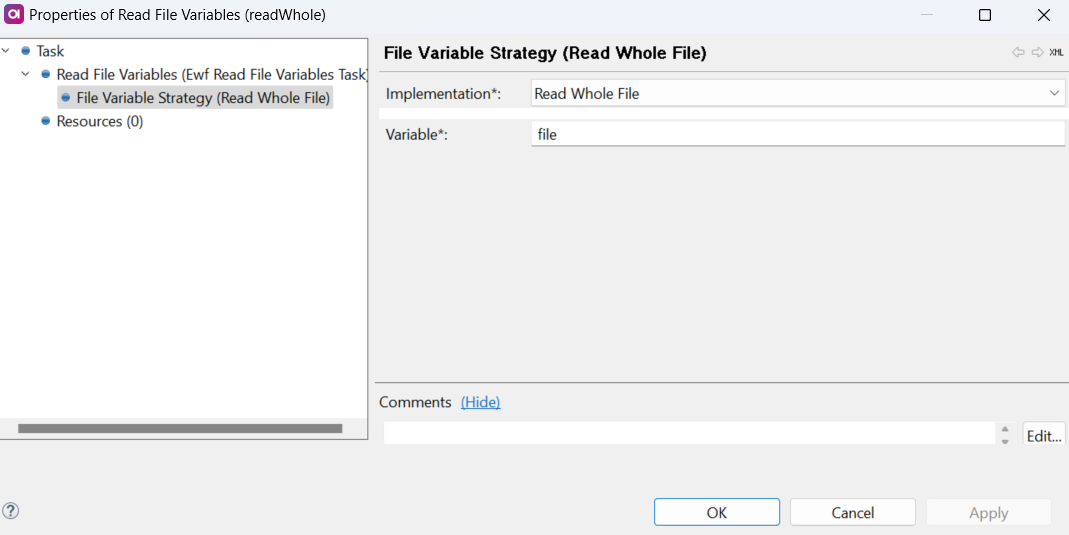Read File Variables
Reads workflow variables from a source file. You can specify which properties should be read from the source file along with a specific data type and format parameters (see File variable strategy). There are three implementations available:
-
Read property file: Source file contains properties defined as key-value pairs (syntax
<code>property.key=property.value</code>) with one property per line. If a line is not correctly structured, the property is skipped. Using whitespaces in values is allowed at any position in the string, for example, '<code>key= value</code>' or '<code>key=va lue</code>'.For more information about how source files are parsed, see the Java documentation about the Propertiesclass.If the source file contains duplicated keys, the task fails.
-
Read lines: Each variable is read from a line of the source file. The line itself is fully used as variable’s value, including all whitespace characters except line-ending characters.
-
Read whole file: Whole file is read and stored into a variable. Any lines beyond the limit are discarded, that is, not part of the variable value. Note that the value can also contain line-ending characters (
<code>'\r'</code>or<code>'\n'</code>).
Once the data is loaded, you can reuse the values across the workflow using the following syntax: ${ewfGetTaskVariable("task_name", "key")}.
|
For more information about working with workflow variables, see Workflow Variables.
|
When using the Text File Writer step in your plan, it is necessary to change the default writer configuration and remove the string qualifier and string qualifier escape character as this causes problems when using the Read File Variables task. 
|
Properties
| No expression support is available. |
| Name | Type | Description | ||
|---|---|---|---|---|
Source File |
mandatory |
Source file that the task should read.
The default extension is |
||
Encoding |
mandatory |
Encoding used in the source file. The possible encodings are all encodings supported by the target Java platform. Some commonly used encodings are: ISO-8859-1, ISO-8859-2, and UTF-8. |
||
Max Lines |
optional |
Maximum number of lines that the task reads from the source file.
Default value:
|
File variable strategy
| Name | Type | Description |
|---|---|---|
Implementation |
mandatory |
Type of file variable strategy. Read property file, Read lines, or Read whole file. |
Variables
Read property file
Example configuration

| Name | Type | Description |
|---|---|---|
Name |
mandatory |
Name of the variable. |
Type |
mandatory |
Defines how to read the variable value.
Currently supported types are: |
Data format parameters |
optional |
Default data format parameters for the correct formatting of data in the source file. For more information, see Data format parameters. |
Read lines
Example configuration

| Name | Type | Description |
|---|---|---|
Line |
mandatory |
Line number from source file. |
Name |
mandatory |
Name of the line. |
Type |
mandatory |
Defines how to read the variable value.
Currently supported types are: |
Data format parameters |
optional |
Default data format parameters for the correct formatting of data in the source file. For more information, see Data format parameters. |
Data format parameters
| Name | Type | Description |
|---|---|---|
Array separator |
optional |
Defines which character is used as the array separator. |
Date format local |
optional |
Defines the locale for parsing non-numerical data (for example, short forms of months in dates, such as Sep 18, 1999). The value is the same as the value of the corresponding locale in Java (see Java locales). |
Datetime format |
optional |
Defines the format that should be used for processing |
Day format |
optional |
Defines the format that should be used for processing |
Decimal separator |
optional |
Defines which character is used as the decimal separator. Escaped string property. |
False value |
optional |
String value representing a logical |
Thousand separator |
optional |
Defines the string that represents the thousands separator (used in numbers). A non-escaped character is expected. Numbers do not need to contain this separator, but when the separator is present, it is processed (stripped) accordingly. Escaped string property. Default value: |
True value |
optional |
String value representing a logical |
Example
<?xml version='1.0' encoding='UTF-8'?>
<EwfTaskElement>
<acceptMode>ALL_VALID</acceptMode>
<executable maxLines="1000" encoding="UTF-8" class="com.ataccama.adt.task.exec.EwfReadFileVariablesTask" sourceFile="variables.ewfv">
<fileVariableStrategy class="com.ataccama.adt.variables.read.ReadPropertyFile">
<variables>
<variableMapping name="variable1" type="STRING">
<dataFormatParameters falseValue="false" dateTimeFormat="yy-MM-dd HH:mm:ss" decimalSeparator="." dayFormat="yy-MM-dd" trueValue="true" dateFormatLocale="en_US" thousandsSeparator=""/>
</variableMapping>
<variableMapping name="variable2" type="STRING">
<dataFormatParameters falseValue="false" dateTimeFormat="yy-MM-dd HH:mm:ss" decimalSeparator="." dayFormat="yy-MM-dd" trueValue="true" dateFormatLocale="en_US" thousandsSeparator=""/>
</variableMapping>
</variables>
</fileVariableStrategy>
</executable>
<id>read_variable</id>
<priority>0</priority>
</EwfTaskElement>Was this page useful?

